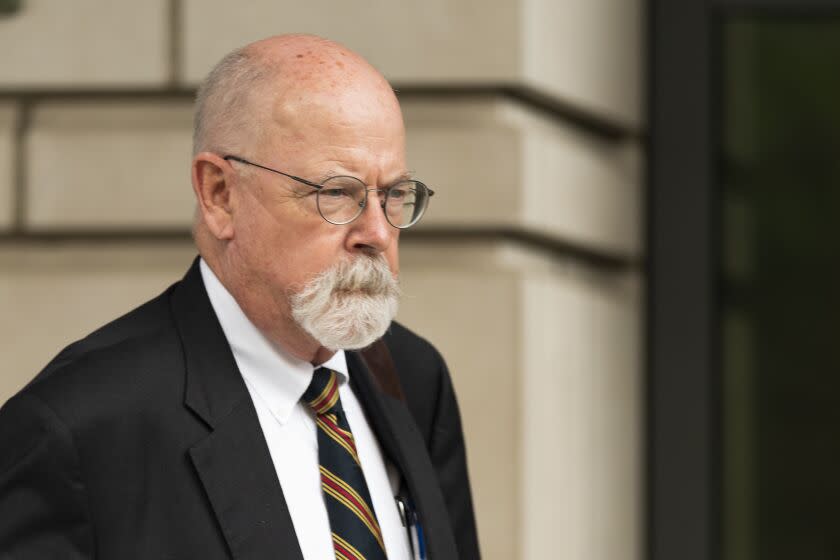Column: Why Special Counsel John Durham's report takes so long to say so little

Rarely has a government report taken so long — in years and pages — to tell the public so little as Special Counsel John Durham’s report to the Department of Justice this week.
When then-Atty. Gen. Bill Barr appointed Durham to investigate the department’s probe of connections between Russia and Donald Trump’s 2016 campaign, Trump and his true believers looked forward to revealing a criminal conspiracy within the FBI. Trump tweeted at the time that Durham would uncover the “crime of the century.”
Instead, four years after Barr first ordered Durham to investigate the investigators, he produced a ponderous, 316-page tome that interminably chews over information that has long been in the public record.
The bottom line awaiting the minuscule percentage of the country that has the time and patience to wade through the report is a handful of small and already familiar cavils about the procedural details of the FBI’s work.
Durham’s mission was always questionable. After the FBI received a tip from an Australian diplomat that the Trump campaign had advance knowledge of the Russia-linked hacking of Democratic Party emails, the bureau had no responsible choice but to investigate the matter. Moreover, Special Counsel Robert Mueller’s investigation proved itself by securing an impressive series of guilty pleas from high-profile Trump associates.
Barr nevertheless gave Durham a long leash on a dubious investigation by elevating him to special counsel status. And while the relevant regulations instruct the special counsel to “provide the Attorney General with a confidential report explaining the prosecution or declination decisions reached,” Barr also directed that the report be suitable for public dissemination “to the maximum extent possible.”
The result is one more illustration of why prosecutors are not supposed to accompany their decisions with editorial broadsides about the people they aren’t charging. Rather than explain his limited prosecutorial decisions, Durham issues vague critiques of officials’ conduct, including that they lacked "analytical rigor.” Elsewhere he takes the FBI to task for its handling of the investigation of Trump campaign official Carter Page, which had nothing to do with the inception of Crossfire Hurricane, the Russia investigation.
Most of this is workaday stuff that does nothing to advance the suggestion that the FBI had it in for Trump. As to that central point, Durham acknowledges that “there is no question that the FBI had an affirmative obligation to closely examine” the tip that sparked the probe.
So what is Durham’s actual difference with the bureau’s decision to launch an investigation? He reveals his hand at page 295 of the report, where the exhausted reader learns he believes the FBI could have instead taken the “sensible step” of opening a preliminary investigation that could have later escalated into a full one.
This is a mighty thin reed on which to support Durham’s insinuations of FBI misconduct. It’s also highly debatable. Information from an ally suggesting our greatest foreign adversary might be collaborating with a presidential campaign required an immediate and thorough response.
Durham’s conclusion is exactly contrary to that of the Justice Department's inspector general, Michael Horowitz, whose 2019 report on substantially overlapping matters found that the Australian tip was sufficient to open a full counterintelligence inquiry. Horowitz found no evidence that the FBI had any improper political motive.
It’s tempting to dismiss Durham’s report as a long-winded attempt to justify his abysmal record as special counsel. Durham took twice as long as Mueller to bring three small cases that had next to nothing to do with his central task, yielding two acquittals and one guilty plea that resulted in no prison time. Moreover, his office was roiled by controversy: His respected deputy, Nora Dannehy, resigned in 2020, reportedly out of concern that Durham was politicizing the investigation.
Unfortunately, Durham's handiwork might not be as benign as it is insubstantial. The report will serve — indeed, it looks designed to serve — the toxic, false, far-right narrative that deep-state law enforcement agencies were out to get Trump. It’s a sort of time bomb, set in 2019 to go off now, as the 2024 campaign gets started.
Immediately after the report was released Monday, Trump proclaimed that it showed “the American Public was scammed.” Even his chief rival for the Republican nomination, Ron DeSantis, fell in line, claiming the report “confirmed what we already knew: weaponized federal agencies manufactured a false conspiracy theory about Trump-Russia collusion.” And Trump henchman Jim Jordan announced plans to hold a hearing featuring Durham as the star witness.
All of which ensures new momentum for wild-eyed theories that misinform the public, aggravate our partisan divide and provide fodder for Trump’s effort to reprise our most dangerous presidency.
Harry Litman is the host of the “Talking Feds” podcast. @harrylitman
This story originally appeared in Los Angeles Times.


